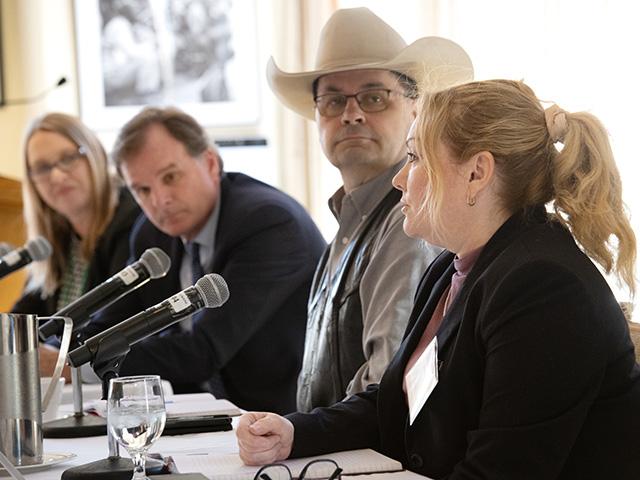Ad-Hoc Disaster Aid and the Farm Bill
California Lawmakers Ask for Disaster Aid as Farm Bill Looks to Debate Those Needs
WASHINGTON (DTN) -- As agricultural leaders in Congress debate the merits of crafting a new disaster aid program for producers, members of Congress from California are asking for more ad-hoc aid to deal with hundreds of millions in agricultural losses from catastrophic flooding that has hit farmers in that state so far this year.
At least four members of the California delegation wrote a letter Monday to congressional leaders citing the damages farmers and ranchers have faced from flooding due to the "atmospheric rivers" that hit the state.
"For nearly three weeks, California was hit with storms that brought intense rain and catastrophic flooding. The historic storms caused tremendous damage to thousands of acres of farms and ranches," the lawmakers said in a letter to top House leaders and appropriators. "We, therefore, request a disaster recovery package be swiftly put together to allow the rebuilding and recovery process to begin. It is imperative Congress provide much-needed aid to California's agricultural community to allow for a full and timely recovery."
Reps. Salud Carbajal and Jimmy Panetta, both Democrats, represent areas that have seen more than $500 million in estimated losses to farms and ranches in their districts. The lawmakers, along with Reps. Jim Costa and Zoe Lofgren, also Democrats, cited more than 1,000 claims filed with local FSA offices just from a handful of counties in south-central California. The lawmakers wrote House Speaker Kevin McCarthy, R-Calif., who also represents an agricultural district in the state.
"It is imperative Congress provide much-needed aid to California's agricultural community to allow for a full and timely recovery," the lawmakers wrote.
USDA LEADERS TALK ABOUT DISASTERS
Robert Bonnie, USDA's undersecretary for Farm Production and Conservation, spoke Monday to members of the North American Agricultural Journalists (NAAJ) about USDA temporarily boosting staff at local offices around disaster areas. Bonnie noted in his comments that some areas of California are facing prevented-planting claims because of the flooding.
Asked about the farm bill and information requests from Congress, Bonnie noted, "There's a lot of interest right now about crop insurance and the relationship with ad-hoc disaster aid," he said, adding, "Again, the question of what role ad hoc disaster plays versus crop insurance is an important area."
P[L1] D[0x0] M[300x250] OOP[F] ADUNIT[] T[]
Zach Ducheneaux, administrator for the Farm Service Agency (FSA), said a major issue right now is trying to work with dairy producers to get them hay and other feed. Ducheneaux said that often FSA finds itself in reaction mode when it comes to helping manage various issues with disasters.
"In the case of a number of our FSA programs, we've often had to wait to understand the nature of that disaster and how to make payments, those types of things," Ducheneaux said. "Sometimes on the FSA side, there's a lag, but even with that lag, there's always going to be increased demand."
Ducheneaux pointed to the California flooding coming on the heels of prolonged drought. He said USDA is having to adjust to disasters such as "atmospheric rivers" or "derechos" that have hit in recent years.
"Our tools are going to continue to be adjusted to better fit," Ducheneaux said.
One of the issues that USDA often faces with ad-hoc disaster relief from Congress is adjusting its software, staff and training depending on specific requirements Congress writes for the aid.
"It's a challenge when Congress changes the rules on disaster and FSA or RMA have to go in and tweak programs, tweak the software or things like that," Bonnie said.
California also often has larger farms with specialty crops and disasters that often do not fit into income caps or payment caps meant to help smaller operations.
"The programs weren't designed for that entirety of an industry to suffer all of that impact at once," Ducheneaux said. He added, "Hopefully, we can find the flexibility in our programs to better meet the needs that are actually out there."
AD HOC FUNDING GROWS
Since the last farm bill became law in 2018, farmers and livestock producers have received a total of $93 million in various forms of ad-hoc disaster or trade payments -- first driven by the trade war with China, then the pandemic.
John Newton, an economist for Republicans on the Senate Agriculture Committee, said that ad-hoc aid accounts for about 70% of the total support for producers over that time. At least some of that problem stems from reference prices in the Price Loss Coverage (PLC) program that now go back more than a decade and need to be updated. More support for commodity programs is needed as the next farm bill is debated.
"We're not going to do a farm bill if we don't take care of the farmers," Newton said.
Republicans want to open the $37 billion for USDA in the Inflation Reduction Act (IRA) that includes $18.4 billion in conservation, $13.3 billion in Rural Development and $5 billion in forestry. Noting that funding was passed with only Democratic votes, Newton said that funding should come back into the farm bill with a new conversation about priorities.
"I think the senators' perspective was that it wasn't a bipartisan conversation about how best to allocate those resources," Newton said.
Chris Clayton can be reached at Chris.Clayton@dtn.com
Follow him on Twitter @ChrisClaytonDTN
(c) Copyright 2023 DTN, LLC. All rights reserved.




